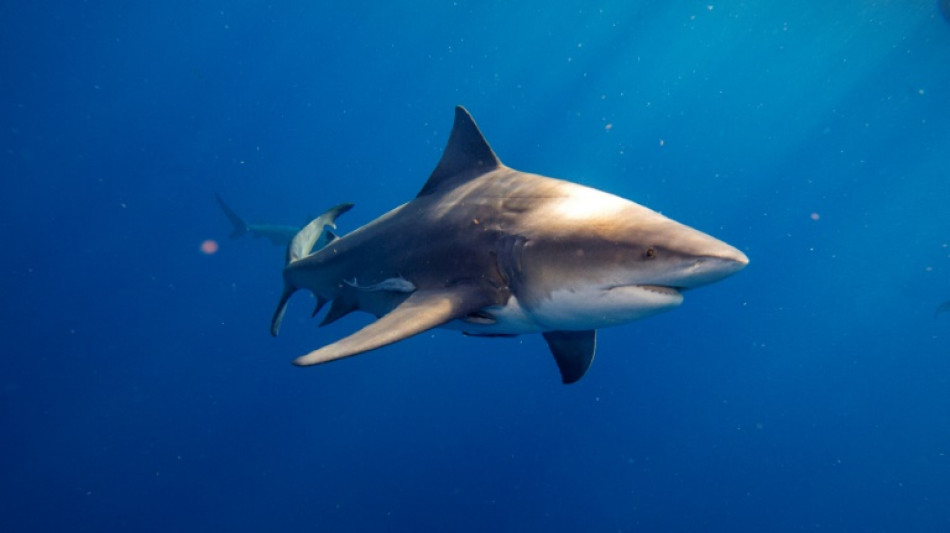
-
 Epstein survivors say abusers 'remain hidden' after latest files release
Epstein survivors say abusers 'remain hidden' after latest files release
-
'Full respect' for Djokovic but Nadal tips Alcaraz for Melbourne title

-
 Wollaston goes back-to-back in the Cadel Evans road race
Wollaston goes back-to-back in the Cadel Evans road race
-
Women in ties return as feminism faces pushback

-
 Ship ahoy! Prague's homeless find safe haven on river boat
Ship ahoy! Prague's homeless find safe haven on river boat
-
Britain's Starmer ends China trip aimed at reset despite Trump warning

-
 Carlos Alcaraz: rare tennis talent with shades of Federer
Carlos Alcaraz: rare tennis talent with shades of Federer
-
Novak Djokovic: divisive tennis great on brink of history

-
 History beckons for Djokovic and Alcaraz in Australian Open final
History beckons for Djokovic and Alcaraz in Australian Open final
-
Harrison, Skupski win Australian Open men's doubles title

-
 Epstein offered ex-prince Andrew meeting with Russian woman: files
Epstein offered ex-prince Andrew meeting with Russian woman: files
-
Jokic scores 31 to propel Nuggets over Clippers in injury return

-
 Montreal studio rises from dark basement office to 'Stranger Things'
Montreal studio rises from dark basement office to 'Stranger Things'
-
US government shuts down but quick resolution expected

-
 Mertens and Zhang win Australian Open women's doubles title
Mertens and Zhang win Australian Open women's doubles title
-
Venezuelan interim president announces mass amnesty push

-
 China factory activity loses steam in January
China factory activity loses steam in January
-
Melania Trump's atypical, divisive doc opens in theatres

-
 Bad Bunny set for historic one-two punch at Grammys, Super Bowl
Bad Bunny set for historic one-two punch at Grammys, Super Bowl
-
Five things to watch for on Grammys night Sunday

-
 Venezuelan interim president proposes mass amnesty law
Venezuelan interim president proposes mass amnesty law
-
Rose stretches lead at Torrey Pines as Koepka makes cut

-
 Online foes Trump, Petro set for White House face-to-face
Online foes Trump, Petro set for White House face-to-face
-
Seattle Seahawks deny plans for post-Super Bowl sale

-
 US Senate passes deal expected to shorten shutdown
US Senate passes deal expected to shorten shutdown
-
'Misrepresent reality': AI-altered shooting image surfaces in US Senate

-
 Thousands rally in Minneapolis as immigration anger boils
Thousands rally in Minneapolis as immigration anger boils
-
US judge blocks death penalty for alleged health CEO killer Mangione

-
 Lens win to reclaim top spot in Ligue 1 from PSG
Lens win to reclaim top spot in Ligue 1 from PSG
-
Gold, silver prices tumble as investors soothed by Trump Fed pick

-
 Ko, Woad share lead at LPGA season opener
Ko, Woad share lead at LPGA season opener
-
US Senate votes on funding deal - but shutdown still imminent

-
 US charges prominent journalist after Minneapolis protest coverage
US charges prominent journalist after Minneapolis protest coverage
-
Trump expects Iran to seek deal to avoid US strikes

-
 Guterres warns UN risks 'imminent financial collapse'
Guterres warns UN risks 'imminent financial collapse'
-
NASA delays Moon mission over frigid weather

-
 First competitors settle into Milan's Olympic village
First competitors settle into Milan's Olympic village
-
Fela Kuti: first African to get Grammys Lifetime Achievement Award

-
 'Schitt's Creek' star Catherine O'Hara dead at 71
'Schitt's Creek' star Catherine O'Hara dead at 71
-
Curran hat-trick seals 11 run DLS win for England over Sri Lanka

-
 Cubans queue for fuel as Trump issues energy ultimatum
Cubans queue for fuel as Trump issues energy ultimatum
-
France rescues over 6,000 UK-bound Channel migrants in 2025

-
 Surprise appointment Riera named Frankfurt coach
Surprise appointment Riera named Frankfurt coach
-
Maersk to take over Panama Canal port operations from HK firm

-
 US arrests prominent journalist after Minneapolis protest coverage
US arrests prominent journalist after Minneapolis protest coverage
-
Analysts say Kevin Warsh a safe choice for US Fed chair

-
 Trump predicts Iran will seek deal to avoid US strikes
Trump predicts Iran will seek deal to avoid US strikes
-
US oil giants say it's early days on potential Venezuela boom

-
 Fela Kuti to be first African to get Grammys Lifetime Achievement Award
Fela Kuti to be first African to get Grammys Lifetime Achievement Award
-
Trump says Iran wants deal, US 'armada' larger than in Venezuela raid


Sharks killed at alarming rates despite regulations: study
Global shark populations are plummeting despite worldwide efforts to curb mass killings for their fins, researchers said in a new report showing that more needs to be done to protect one of the ocean's apex species.
Between 2012 and 2019, the number of sharks killed from fishing increased from some 76 million a year to more than 80 million, they reported in the journal Science.
At least 25 million were threatened species.
Sharks have prowled Earth's waters for 400 million years, but a growing appetite for their fins -- a valuable commodity in Asian markets -- has driven several species to the brink of extinction.
Today, 70 percent of countries and jurisdictions have implemented protective regulations to eliminate shark finning, where the top predators are tossed back into the ocean and left to die once fins are removed.
But some of these rules -- which first emerged in the 1990s -- have had unintended consequences that are costing even more sharks their lives, new data revealed.
Finning has marginally declined over the past two decades, but policies requiring fishers to land whole sharks inadvertently incentivised a market for shark meat.
"Anti-finning measures were not the silver bullet we hoped for," study author Laurenne Schiller told AFP.
Researchers spent three years collecting data on fishery regulations and shark mortality.
They were surprised to learn "how widespread the trade with shark meat, oil and cartilage is, and how sharks are showing up in a lot of products without consumers being aware," said lead author Boris Worm.
- Blood in the water -
Fisheries are now catching smaller sharks, including juveniles, more often, because of the decline in the fin trade and regional declines in the abundance of large sharks.
In hotspots where shark mortality is greatest, researchers found a higher use of gillnets -- walls of netting that hang in the water -- and trawls, which is heavy netting dragged along the ocean floor.
Despite being highly evolved ocean predators, sharks are incredibly vulnerable, Schiller said.
"Sharks have spent over 99% of their time on Earth in an ocean without humans, so in many ways, they were not prepared for us and the impacts of fishing."
As a keystone species, sharks are crucial for keeping oceans healthy.
"When we lose these species, it can throw off the balance of the marine ecosystem", she said.
Today, one in three shark species around the world is threatened with extinction.
On a more positive note, Worm emphasised that many nations and territories have already implemented shark fishing prohibitions and sanctuaries to safeguard one of the world's oldest species.
Implementing shark sanctuaries and no-take protected areas seem to keep shark mortality levels low, according to the study.
Still, the current risks for coastal sharks appear to be escalating globally, a conclusion supported by the International Union for the Conservation of Nature (IUCN).
"We need to take a more targeted approach to reducing shark mortality," Schiller said.
F.Mueller--VB




